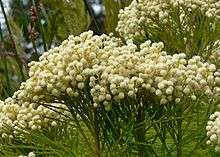Bruniaceae
Bruniaceae is a family of shrubs native to the cape region of South Africa. They are mostly restricted to the Cape Province, but a small number of species occur in KwaZulu-Natal.[2]
| Bruniaceae | |
|---|---|
 | |
| Berzelia lanuginosa | |
| Scientific classification | |
| Kingdom: | Plantae |
| Clade: | Tracheophytes |
| Clade: | Angiosperms |
| Clade: | Eudicots |
| Clade: | Asterids |
| Order: | Bruniales |
| Family: | Bruniaceae R.Br. ex DC.[1] |
| Genera | |
|
See text | |
Description
Species belonging to the Bruniaceae are heath-like shrubs. They have small, hard, scaly leaves that are alternate but regularly set and overlapping. A distinct character is the minute black tip of the leaves when these are young. The inflorescence is a dense spike or spherical flowerhead with up to 400 flowers at the end of the stems. Individual flowers are tube-shaped and hermafrodite, there are five sepals which may be free or connected at their rim, while the ovary sits under the other parts of the flower. The fruit is dry when ripe, opens with two or four valves and contains fleshy seeds.[3]
Taxonomy
In the APG II taxonomy they are placed in the order Lamiales,[4] but a 2008 study suggested that they are sister to the Columelliaceae,[5] and the Angiosperm Phylogeny Website proposes incorporating this finding by placing both families in order Bruniales.[2]
Genera
There are twelve genera, totalling 75 species:
- Audouinia Brongn.
- Berzelia Brongn.
- Brunia Lam.
- Linconia L.
- Lonchostoma Wikstr.
- Mniothamnea (Oliv.) Nied.
- Nebelia Neck. ex Sweet
- Pseudobaeckea Nied.
- Raspalia Brongn.
- Staavia Dahl
- Thamnea Sol. ex Brongn.
- Tittmannia Brongn.
References
- Angiosperm Phylogeny Group (2009). "An update of the Angiosperm Phylogeny Group classification for the orders and families of flowering plants: APG III". Botanical Journal of the Linnean Society. 161 (2): 105–121. doi:10.1046/j.1095-8339.2003.t01-1-00158.x.
- "Asterales".
- M. Koekemoer, H.M. Steyn & S.P. Bester. "Bruniaceae". Guide to Plant Families of southern Africa. Retrieved 2016-03-01.
- Angiosperm Phylogeny Group (2003). "An update of the Angiosperm Phylogeny Group classification for the orders and families of flowering plants: APG II". Botanical Journal of the Linnean Society. 141 (4): 399–436. doi:10.1046/j.1095-8339.2003.t01-1-00158.x.
- Winkworth, Richard C.; Lundberg, Johannes; Donoghue, Michael J. (2008). "Toward a resolution of Campanulid phylogeny, with special reference to the placement of Dipsacales". Taxon. 57 (1): 53–65.